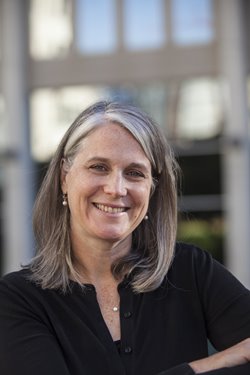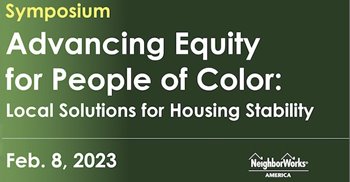During the pandemic, the nation realized even more the importance of a stable home, as where we live also became the place where we accessed education, healthcare and community. But disparities loomed.
Now, as communities and individuals work to bounce back from pandemic-related economic hardships, NeighborWorks America is hosting a symposium, "Advancing Equity for People of Color: Local Solutions for Housing Stability." The symposium will include a roundtable, panels and discussions about equitable solutions for housing stability.
 "The pandemic exacerbated an already existing housing crisis," explains Lee Anne Adams, NeighborWorks' senior vice president of National Initiatives. "At NeighborWorks, we've always worked to help promote and create affordable homes, and helping people stay in their homes is vital to our mission. We have seen how important it is to adapt solutions, connect people with resources and foster meaningful partnerships over the past few years, especially through the Housing Stability Counseling Program."
"The pandemic exacerbated an already existing housing crisis," explains Lee Anne Adams, NeighborWorks' senior vice president of National Initiatives. "At NeighborWorks, we've always worked to help promote and create affordable homes, and helping people stay in their homes is vital to our mission. We have seen how important it is to adapt solutions, connect people with resources and foster meaningful partnerships over the past few years, especially through the Housing Stability Counseling Program."
Adams says that people of color, particularly Black, Latino, Asian American and Pacific Islander, and Native American (American Indian and Alaska Native) residents, are among those hardest hit by the pandemic. "It was important to NeighborWorks to highlight that impact, along with solutions and trends," she says. "We've brought together a great mix of community developers – local, state and national leaders, including our own network organizations, to share their experiences and perspectives."
What the data tells us
Peter Hepburn, a sociologist with Princeton University's Eviction Lab has been keeping track of evictions, especially during the pandemic. In 2020, he says, eviction filings by landlords were lower than usual, likely connected to strong eviction moratoria and protections from both federal and state governments.
"Forty-three states and the District of Columbia had their own eviction moratoria," he says. A moratorium instituted by the Centers for Disease Control and Prevention lasted until mid-2021, near the time that federal appropriations became available to help residents pay back rent. But even with billions of dollars in aid, Hepburn says, "Over 2022, the eviction filings continued to increase. By the end of the year, we were back to normal, to where we were before the pandemic."
moratorium instituted by the Centers for Disease Control and Prevention lasted until mid-2021, near the time that federal appropriations became available to help residents pay back rent. But even with billions of dollars in aid, Hepburn says, "Over 2022, the eviction filings continued to increase. By the end of the year, we were back to normal, to where we were before the pandemic."
"Normal" means 3.6 million court-filed evictions in a given year. Both before and during the pandemic, eviction numbers have been higher in lower-income and majority-Black neighborhoods. "When we count by race, eviction rates for Black renters are in many cases double that of white renters, especially in larger cities," Hepburn says.
Why? The answer can be harder to pin down. A salary disparity breaks down along racial lines, with Black workers earning 76 cents for each dollar earned by white workers, according to the Department of Labor. A typical renter often has less money in savings, and that, too, can break down across racial lines, Hepburn says.
"And we haven't eliminated racial discrimination as a plausible explanation, though making the case for racial discrimination can be hard."
The consequences of eviction include a far-reaching range of problems — from financial to medical. That includes depression, increased hypertension and suicidal ideation and, for children, exposure to health hazards. A study that came out of the lab last year showed women evicted during pregnancy had children with health problems including lower birth rates, premature births and more. "Not having a stable home can affect all parts of life," Hepburn says. "Even if you're not evicted, having an eviction case against you can follow you around, making it harder to get housing in the future."
A focus on fixes
The NeighborWorks symposium will examine housing stability problems and solutions, including help from housing counselors, channeling resources, partnering with landlords to prevent evictions, tech equity and more.
 Martha M. Galvez, executive director of the Housing Solutions Lab at NYU Furman Center, will moderate the plenary panel, "Equitable Solutions for Housing Stability." Her organization works with small and mid-sized cities across the country on a range of housing policy topics. Racial equity is a guiding force that unites them.
Martha M. Galvez, executive director of the Housing Solutions Lab at NYU Furman Center, will moderate the plenary panel, "Equitable Solutions for Housing Stability." Her organization works with small and mid-sized cities across the country on a range of housing policy topics. Racial equity is a guiding force that unites them.
As the pandemic continued, Galvez recalls, "Everyone was waiting for a tsunami of evictions." But while evictions did return to pre-pandemic levels in many places, the tsunami didn't come. In part, "that's because there was also a tsunami of programs and intentions to do something about it." The symposium "feels like a good point to look back and remember that housing is and was having a moment – even if it's a moment that was driven by trauma," Galvez says. "We can hold onto that moment and turn it into positive change."
One way to do that, experts agree, is to continue some of the supports that came along during the pandemic. But how? The symposium, with its focus on solutions and resources is asking the right questions.
"This is what folks are grappling with right now," Galvez says. "How do we support what we started? How do we help local government leaders who have started this work but need more sustainable funding and technical support? How do we not lose momentum?"
Housing is an issue that affects cities of all sizes and people of all income ranges. And the housing crisis, Galvez explains, started long before the pandemic. "The pandemic just amplified it. Now we have to not regress to accepting where we were before. We're at an inflection point of how people are thinking about the housing crisis and possible solutions."
 Across the NeighborWorks network, organizations have reported innovative ways of aiding in housing stability for their communities, buoyed by the Housing Stability Counseling Program. In Maine, Community Concepts holds monthly workshops on foreclosure diversion at an area courthouse. In Florida, Centro Campesino reached out to area banks, informing them of foreclosure prevention counseling services. In Ohio, East Akron Neighborhood Development Corporation reached out to rental housing clients and worked with property managers to identify renters who were struggling. The symposium will share even more innovations and solutions from the NeighborWorks network that housing and community development organizations can take back to their colleagues and residents to kick off additional conversations around what can be done.
Across the NeighborWorks network, organizations have reported innovative ways of aiding in housing stability for their communities, buoyed by the Housing Stability Counseling Program. In Maine, Community Concepts holds monthly workshops on foreclosure diversion at an area courthouse. In Florida, Centro Campesino reached out to area banks, informing them of foreclosure prevention counseling services. In Ohio, East Akron Neighborhood Development Corporation reached out to rental housing clients and worked with property managers to identify renters who were struggling. The symposium will share even more innovations and solutions from the NeighborWorks network that housing and community development organizations can take back to their colleagues and residents to kick off additional conversations around what can be done.
NeighborWorks continues to work to bring ideas and solutions like these together. To join the conversation, register for the event, which takes place Feb. 8 during the Virtual Training Institute.
01/25/2023

